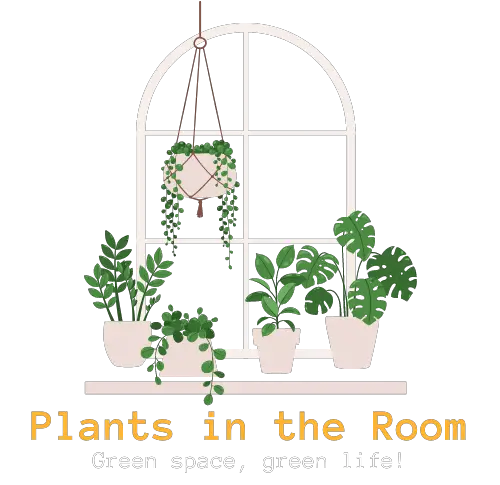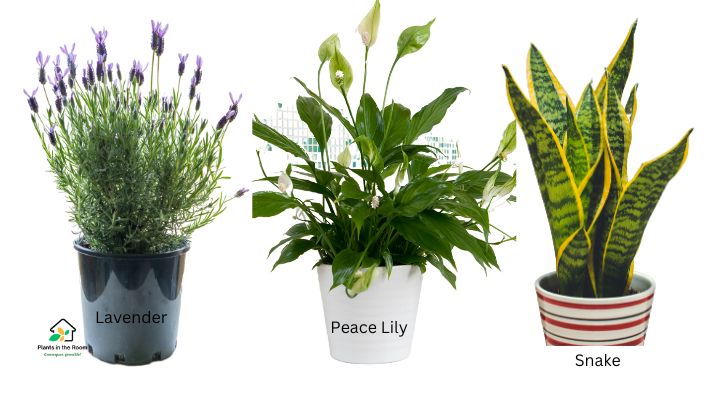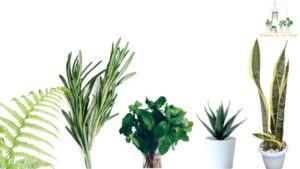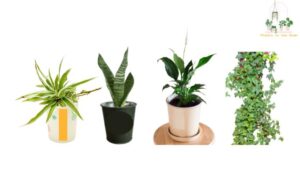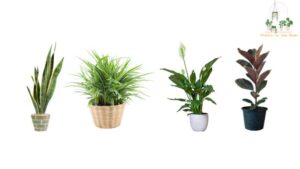This article covers the following areas –
- What Is Stress & How Does It Affect Our Life?
- 1) Lavender
- 2) Snake Plant
- 3) Philodendron
- 4) Peace Lily
- 5) Boston Fern
- In Conclusion
- Frequently Asked Questions (FAQs) about Stress-Reducing Plants
As a plant enthusiast, I’ve always been fascinated by the positive impact of greenery on my mental health. Whether you’re working from home or spending long hours in the office, stress can sometimes feel like an unwelcome guest that never leaves. That’s why I’m excited to share my knowledge about five amazing stress-reducing plants that you must have in your home and office.
These plants not only add a touch of natural beauty to your space but also help to create a more relaxed and soothing environment. Let’s dive in and explore the benefits of these green companions!
Indoor plants such as Lavender, Snake Plant, Philodendron, Peace Lily, and Boston Fern can help reduce stress by creating a calming and soothing environment in your home or office. They also help to boost mood, enhance cognitive function, and improve your overall well-being.
Now, first, let’s learn how stress affects our lives. Then, we’ll individually see how the above-mentioned plants can help reduce stress.
What Is Stress & How Does It Affect Our Life?
Before discussing how indoor plants can help reduce your stress, let’s try to understand the idea of stress. Stress is a part of our everyday lives, and while a little stress can help us stay motivated and focused, excessive stress can lead to physical and mental health issues, such as anxiety, depression, and insomnia.
Stress is a natural physiological and psychological response to perceived challenges, threats, or demands in our lives. It is our body’s way of preparing for and responding to situations that require attention, action, or adaptation.
Stress affects our lives in various ways, including:
- Physical health: Prolonged stress can cause various physical issues, such as headaches, digestive problems, muscle tension, and fatigue. It can also exacerbate existing health conditions and weaken the immune system, making us more susceptible to illnesses.
- Mental health: Chronic stress can lead to anxiety, depression, irritability, and mood swings. It can also contribute to feelings of helplessness and a lack of control, making it difficult to cope with daily challenges.
- Cognitive function: High stress levels can impact our ability to concentrate, make decisions, and process information effectively. This can lead to forgetfulness, confusion, and difficulty completing tasks.
- Emotional well-being: Stress can cause emotional instability, leading to outbursts of anger, frustration, or sadness. It can also contribute to feelings of loneliness and isolation and a decreased ability to enjoy life.
- Relationships: Stress can strain relationships with family, friends, and coworkers. It can lead to miscommunications, conflicts, and a lack of emotional availability, further exacerbating stress levels.
- Work performance: Excessive stress can negatively impact productivity, creativity, and overall job satisfaction. It can also increase the risk of burnout, decreasing work quality and engagement.
- Sleep: Stress can disrupt sleep patterns, making it difficult to fall asleep or stay asleep. Poor sleep quality can, in turn, increase stress levels, creating a vicious cycle.
- Lifestyle choices: Prolonged stress can lead to unhealthy coping mechanisms, such as overeating, excessive alcohol consumption, or substance abuse. These behaviors can have long-term negative effects on overall health and well-being.
Now, without further ado, let me introduce you to five incredible stress-reducing plants that you must have at home and in the office.
1) Lavender
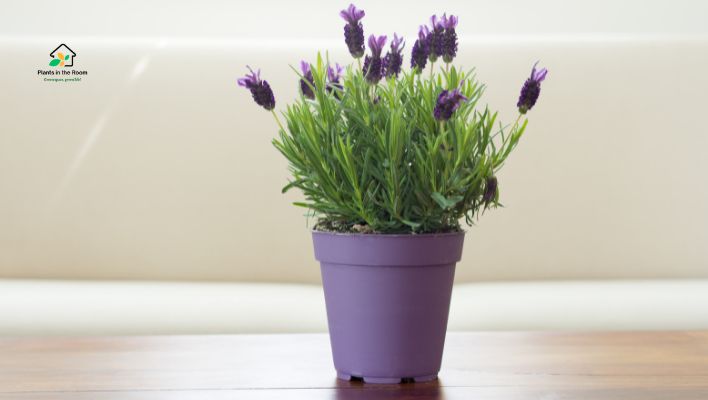
One of my all-time favorites, Lavender (Lavandula), is well-known for its calming and relaxing properties. The beautiful purple flowers and delightful fragrance make it a popular choice for both home and office settings. Lavender is especially effective at reducing stress anxiety and promoting better sleep.
How Lavender helps reduce stress:
- Calming fragrance helps to alleviate anxiety and tension
- Improves sleep quality by promoting relaxation
- Enhances mood and provides a sense of tranquility
Taking care of Lavender:
- Place it in a bright, sunny spot with good airflow.
- Allow the soil to dry slightly between waterings.
- Prune regularly to maintain its shape and encourage new growth.
2) Snake Plant
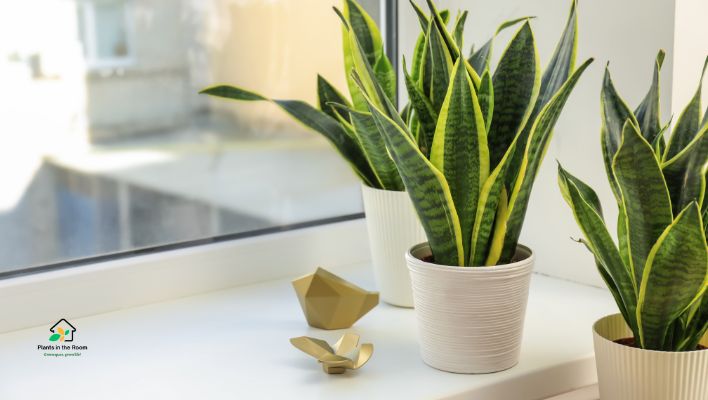
The hardy and low-maintenance Snake Plant (Sansevieria trifasciata) is another excellent choice for creating a stress-free environment. It is known for its ability to purify the air by removing toxins, which can help improve overall well-being. Additionally, the Snake Plant releases oxygen at night, which can contribute to a better night’s sleep.
How the Snake Plant helps reduce stress:
- Purifies the air by removing toxins, promoting overall well-being
- Releases oxygen at night, contributing to better sleep
- The low-maintenance nature provides a sense of accomplishment without added stress
Taking care of Snake Plant:
- Place it in a spot with low to bright indirect light.
- Allow the soil to dry between waterings.
- Be cautious not to overwater, as this can lead to root rot.
3) Philodendron
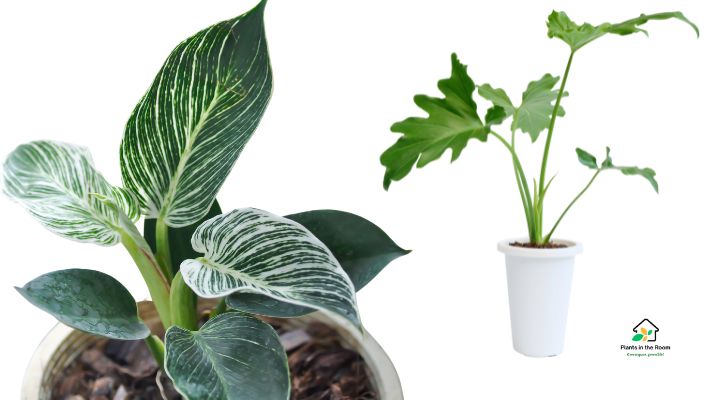
Philodendrons (Philodendron spp.) are popular houseplants due to their attractive foliage and easy-going nature. These plants are visually appealing and have a calming effect on the mind. Having a Philodendron in your space can help reduce stress and promote feelings of relaxation.
How Philodendron helps reduce stress:
- Attractive foliage creates a visually soothing environment
- Encourages feelings of relaxation and calmness
- Easy-going nature makes it simple to care for, reducing stress from plant maintenance
Taking care of Philodendron:
- Place it in a spot with bright, indirect light.
- Keep the soil consistently moist, but avoid overwatering.
- Mist the leaves regularly to maintain humidity.
4) Peace Lily
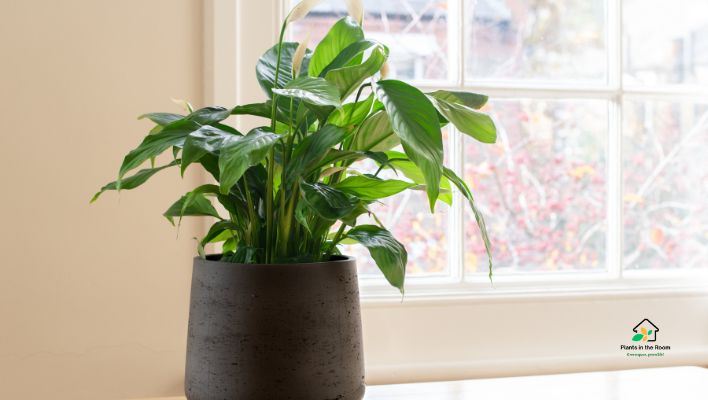
The elegant Peace Lily (Spathiphyllum) is a fantastic stress-reducing plant that can brighten up any room with its beautiful white flowers and glossy green leaves. It is known for its air-purifying properties, removing pollutants such as ammonia, formaldehyde, and benzene, which can contribute to a healthier and more relaxed atmosphere.
How the Peace Lily helps reduce stress:
- Air-purifying properties remove pollutants, promoting a healthier atmosphere
- Beautiful white flowers and glossy green leaves provide a sense of serenity
- Low-maintenance care requirements reduce the stress associated with plant care
Taking care of Peace Lily:
- Place it in a spot with bright, indirect light.
- Keep the soil consistently moist, but avoid overwatering.
- Mist the leaves occasionally to maintain humidity.
5) Boston Fern
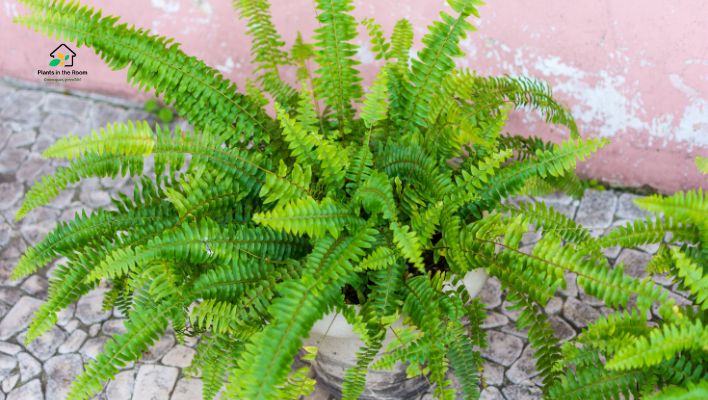
The lush, feathery fronds of the Boston Fern (Nephrolepis exaltata) make it a lovely addition to any space. This plant is a wonderful air purifier and a natural humidifier, making it perfect for those with dry skin or allergies. The presence of a Boston Fern can help create a more soothing and stress-free environment.
How the Boston Fern helps reduce stress:
- Lush, feathery fronds create a visually soothing environment
- Acts as a natural humidifier, improving air quality and comfort
- Regular misting can provide a relaxing, therapeutic routine
Taking care of Boston Fern:
- Place it in a spot with bright, indirect light.
- Keep the soil consistently moist, but avoid overwatering.
- Mist the leaves regularly and maintain high humidity.
In Conclusion
Planting these five stress-reducing plants in your home and office can significantly affect your overall mental well-being. By purifying the air, adding a touch of natural beauty, and creating a more calming atmosphere, these plants can help you feel more relaxed, focused, and productive in your daily life.
In addition to their stress-reducing properties, these plants also offer numerous other benefits, such as improving air quality, boosting mood, and enhancing cognitive function. Caring for plants can be a therapeutic and rewarding activity promoting mindfulness and a sense of accomplishment.
So, if you want to create a more peaceful and stress-free environment at home or in the office, try these fantastic plants. Not only will they help to reduce stress and improve your overall well-being, but they’ll also add a touch of natural beauty to your space.
Happy planting!
Frequently Asked Questions (FAQs) about Stress-Reducing Plants
1. How do plants contribute to stress reduction?
Plants enhance our surroundings by providing a calming and serene ambiance. Their mere presence can help decrease blood pressure, alleviate anxiety feelings, and boost focus and memory. Furthermore, caring for plants can offer therapeutic relaxation.
2. What are the top 5 plants you recommend for stress reduction?
Lavender, Snake Plant, Philodendron, Peace Lily, and Boston Fern are the five prime plants that induce a stress-free environment. Each of these has distinctive attributes that promote tranquility.
3. Which of these plants is ideal for my bedroom?
The Snake Plant and Lavender are especially beneficial for bedrooms. The Snake Plant releases oxygen during the night, fostering better sleep quality. Simultaneously, Lavender’s aroma is celebrated for its calming and sleep-inducing effects.
4. How frequently should I water these particular plants?
Watering requirements vary among these plants. While Snake Plant and Lavender prefer their soil to dry out between waterings, the Boston Fern and Peace Lily appreciate consistent moisture. The Philodendron’s watering needs are moderate, requiring water when the top inch of soil feels dry. Always ensure to check each plant’s specific watering needs.
5. Are these plants safe around my pets?
While plants like Lavender and Boston Fern are generally considered safe, others, like the Philodendron and Peace Lily, can be harmful if ingested by pets. It’s crucial to place potentially harmful plants out of pets’ reach or opt for pet-friendly plant varieties.
6. Can these plants thrive in low-light conditions, like in an office?
Certain plants, such as the Snake Plant and Peace Lily, are known to tolerate low-light conditions, making them perfect for most office spaces. Boston Fern and Philodendron also adapt to medium-light settings. However, Lavender prefers bright light, so it’s best placed near a window or in a well-lit room.
7. How do these plants affect indoor air quality?
Plants like the Snake Plant and Boston Fern are renowned for their air-purifying qualities. They can filter out common indoor pollutants, improving the overall air quality. This creates a healthier environment and can enhance mood and reduce stress.
8. How much space do these plants require?
While plants like Lavender and Boston Fern can grow quite large, others like the Philodendron and Peace Lily have a more compact growth habit. Considering the available space and the plant’s mature size is essential. For instance, a Snake Plant can fit comfortably in a corner or on a desk, but a Boston Fern might thrive better hanging from the ceiling or placed on a stand.
9. What are the signs that my plants are stressed or unhealthy?
Yellowing leaves, stunted growth, or drooping can indicate a plant is stressed. This could be due to over-watering, under-watering, insufficient light, or pest infestations. Regularly checking your plants and adjusting care routines as needed can help address these issues.
10. Can I mix and match these plants in the same room or office?
Absolutely! Combining different plants can create a visually appealing and diverse indoor garden. Ensure each plant’s specific light, water, and space needs are met. For example, placing a Snake Plant near a window and a Boston Fern in a shadier corner can cater to both their light preferences.
